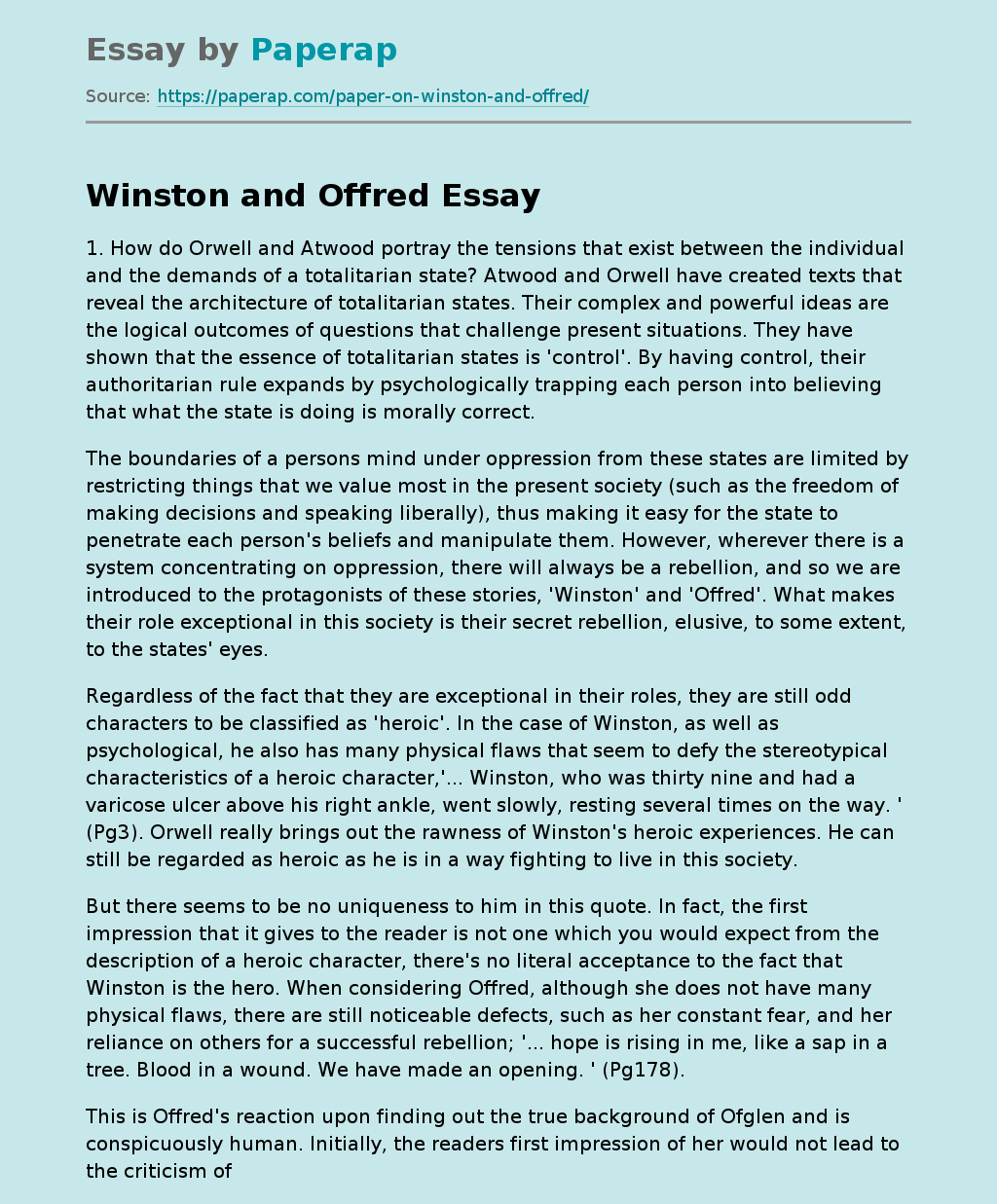The Winston and Offred
The following sample essay on The Winston and Offred. How do Orwell and Atwood portray the tensions that exist between the individual and the demands of a totalitarian state? Atwood and Orwell have created texts that reveal the architecture of totalitarian states. Their complex and powerful ideas are the logical outcomes of questions that challenge present situations. They have shown that the essence of totalitarian states is ‘control’. By having control, their authoritarian rule expands by psychologically trapping each person into believing that what the state is doing is morally correct.
The boundaries of a persons mind under oppression from these states are limited by restricting things that we value most in the present society (such as the freedom of making decisions and speaking liberally), thus making it easy for the state to penetrate each person’s beliefs and manipulate them. However, wherever there is a system concentrating on oppression, there will always be a rebellion, and so we are introduced to the protagonists of these stories, ‘Winston’ and ‘Offred’.
What makes their role exceptional in this society is their secret rebellion, elusive, to some extent, to the states’ eyes.
Regardless of the fact that they are exceptional in their roles, they are still odd characters to be classified as ‘heroic’. In the case of Winston, as well as psychological, he also has many physical flaws that seem to defy the stereotypical characteristics of a heroic character,’… Winston, who was thirty nine and had a varicose ulcer above his right ankle, went slowly, resting several times on the way.
‘ Orwell really brings out the rawness of Winston’s heroic experiences. He can still be regarded as heroic as he is in a way fighting to live in this society. But there seems to be no uniqueness to him in this quote. In fact, the first impression that it gives to the reader is not one which you would expect from the description of a heroic character, there’s no literal acceptance to the fact that Winston is the hero.
When considering Offred, although she does not have many physical flaws, there are still noticeable defects, such as her constant fear, and her reliance on others for a successful rebellion; ‘… hope is rising in me, like a sap in a tree. Blood in a wound. We have made an opening. ‘ This is Offred’s reaction upon finding out the true background of Ofglen and is conspicuously human. Initially, the readers first impression of her would not lead to the criticism of her role as a hero as explicitly as Winston’s role in ‘Nineteen Eighty Four’, but at the same time her role would not be seen as heroic. The flaws in Offered are merely the essence of human nature, defying the uniqueness found in a heroic character. Yet still, they are both the chosen characters to be the foundation of the tensions between them and the totalitarian states.
The demands of the totalitarian states are the very reason for the act of secretive defiance from both Offred and Winston. The desperation of both characters is to be free from such requirements. It is in fact the demands of the totalitarian states that motivate both protagonists to carry out such actions. They can compare past and present societies, because of the subsistence of the past in their memories, and the existence of the realities that they both face; it is the past that makes both characters realise that the society presently in existence is wrong.
As described earlier, the restriction of the social factors valuable our society (Liberal actions and decision making) was the states’ strategy, but concurrently it was also the birth of individuals like Winston and Offred who would always secretly oppose such a strategy. Their memory of the past was like a palimpsest; a constant evaluation of the past and present societies would take place in their minds, and this would lead to a realisation of the social disfigurement that has taken place over time under the rule of such theocratic and morally incorrect states.
Even though, in Winston’s case, his memory of the past is very vague, it is still the only way for him to hope for a fault in his society. In Offred’s case, her memory of the past is strong, because she is not living in a world where thought isn’t free; she is still able to sit, and conceal herself in reveries of the past, without the constant worrying of the infiltration of her mind; ‘But the night is my time out. Where should I go? Somewhere good. You can see the extent of her freedom in this quote, she has absolutely no problem entering the mode of comparison, and can think quite liberally, as she says, the night is her time out, which seems to suggest that its her own time, no-one is there. However, it could be argued that because of the writing style that Orwell adapts, which is in third person; we cannot get a good glimpse of the thoughts running through Winston’s head.
In first person, which Atwood uses, you can feel what the characters is feeling, and get a good view of their intentions. The initial motives of both characters are the same, therefore to escape the demands of the states. But their ways of attainment of such ambitions are different, most probably because of the difference between their societies. Orwell has created a society that is immensely claustrophobic; every decision made by an individual in the society of ‘Nineteen Eighty Four’ is quite literally the decision of the state of Big Brother.
The Winston and Offred. (2017, Sep 17). Retrieved from https://paperap.com/paper-on-winston-and-offred/

